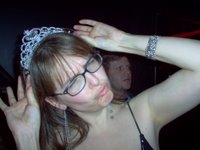I'm trying to get my head around language poetry vs. narrative poetry (and why do they have to be in opposition to each other?), so I decided to do a little research on the Internet to see what I could find (I'm a uniter, not a divider!).
Some background: I was brought up in the narrative tradition of poetry--Post-Confessional and all that. Not New Formalism, but as close as you can get without making the end-words rhyme. I'm still interested in what all that has to offer, but a few years ago (4 to be exact), I was introduced in a major way to the NY Poets, old-school (Ashbery, O'Hara, Koch, and Schuyler). I loved the energy, the personalism, the language of these poets. In turn, I discovered Gertrude Stein and language poetry, and I was hooked. The problem is that, while I love the project of language poetry (the Cubist attention to words, fracturing grammar & syntax, sliding along the sounds of language, etc.), I don't like the alienation I sometimes feel as a reader. Gimme a story already! So, I thought: "why can't I do both...tell a story while using language in a way that is unexpected or rule-breaking?" My first thought was that this was insane. My second thought was that it had surely already been done. And my 3rd thought (which is usually my 3rd thought) was to look it up on the Internet, and see what others have done. So, here I am.
The first place I found told me this:
"L=A=N=G=U=A=G=E P=O=E=T=R=Y was born in 1971 with the release of a new magazine titled This, which culminated in the release seven years later of the magazine titled L=A=N=G=U=A=G=E. The early 1970s was an ideal time for a new movement in poetry. Early challenges to mainstream poetry had already begun, thanks in large part to the Projectivist poets of Charles Olson, a Black Mountain poet."
Unfortunately, it went on to tell me this:
"A difficulty for many readers of L=A=N=G=U=A=G=E P=O=E=T=R=Y is its preoccupation with fragments, nonsense, and unmeaning; as well its rejection of the narrative model that has been the basis of nearly all types of literature...Whether L=A=N=G=U=A=G=E P=O=E=T=R=Y succeeds to gain a large audience is irrelevent."
This didn't bode well for my venture.
Next, I read an article by Marjorie Perloff that boiled down to one point for me...that no matter how hard the LangPo poets try to get away from "authorial domination," someone had to put hand to paper (or fingers to keyboard) and type in those words, make those choices. Bingo. The only way to get away from that would be to create a computer program to automatically generate poems (I've heard such exist), but then what would be the fun of that? Poetry-spew at the push of a button?
Hmm....I'm wondering if composers feel this need as much as writers do...the need to get away from their "authorial domination." We crave the familiar, the machine that works. A broken fax machine just doesn't have the same magic, now does it?
To be continued...
Subscribe to:
Post Comments (Atom)


No comments:
Post a Comment